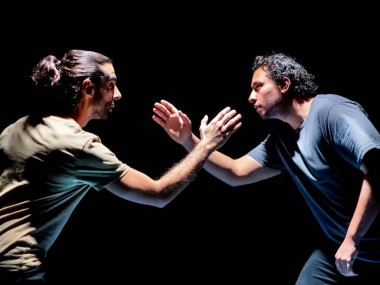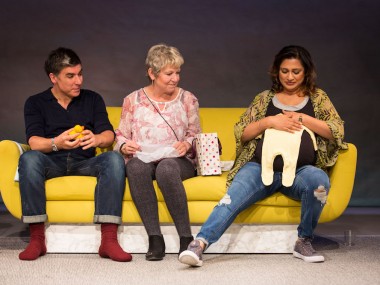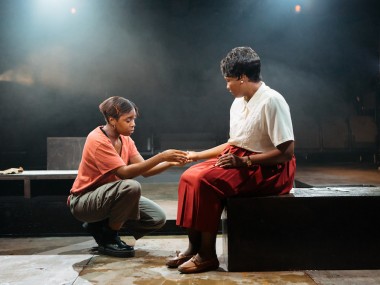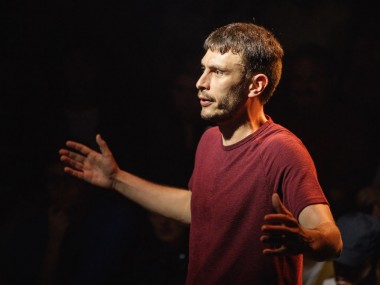The Cord, Bush Theatre
Thursday 23rd May 2024
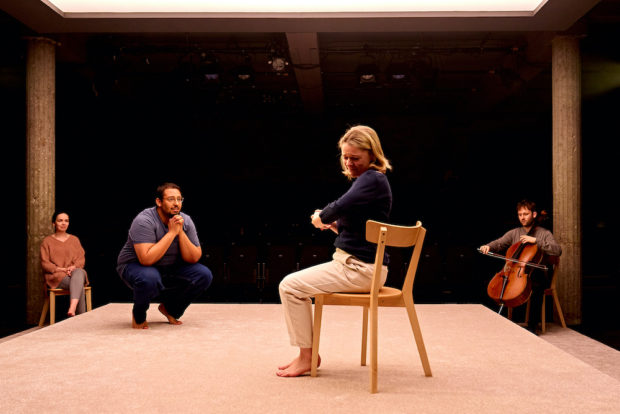
One of life’s paradoxes is that the closer you are to someone the more distant they sometimes feel. But is this always true? With the arrival of a new baby, especially if it’s your first one, everything seems like a new beginning. Clean slate. After all, the baby is a completely fresh human. Yet, as this subtle and intelligent new play shows, the humans who bring up baby are not just free individuals — they also carry their own family baggage. Writer and director Bijan Sheibani — whose recent credits include being a scriptwriter on Nicole Taylor’s Netflix adaptation of David Nicholls’s One Day — explores the way that psychologically we are never really alone. Family from our past are always in the room with us, even when they are physically absent.
The play is a three-hander about thirty-ish Ash and Anya, who are just adjusting to the recent arrival of their first baby, Louis. Both sets of their son’s grandparents are on hand to help, but the only one to appear on stage is Jane, Ash’s mother who is now in her early fifties. The opening scene shows how Jane is both delighted and entranced by Louis, and soon there’s Ash telling Anya that he’s been researching breast feeding and how “the baby doesn’t realise it’s separate from anything, to anyone”. This idea of being inseparable, and the need for people to grow up amicably separate from their parents and perhaps each other, is a central theme of this emotionally intense 80-minute drama.
As both Asha and Anya suffer the usual sleep deprivation and exhaustion of being new parents, despite the help that their parents can provide, it gradually emerges that Ash feels increasingly uncertain about his role as a tiny baby’s father. Sure, as his mother reminds him, he is there to support and help Anya, but he begins to feel redundant. Also something about Anya’s close embrace of Louis starts to remind him of what happened when he was a baby: very obliquely, very subtlety, and all the more powerfully for that, Sheibani suggests that there is a connection, a cord if you like, linking Ash’s current unease with memories of his mother Jane’s postpartum psychosis. But, significantly, these words don’t appear in the play text.
The beauty of Sheibani’s writing is its suggestiveness. There is plenty of psychological and emotional material in this short story, but there are no simple explanations. The situation is one of unease and anxiety: Ash worries that his mother’s negative experiences in the past might be affecting his own feelings of being rejected by Anya, who is now completely, and understandably, preoccupied with Louis. But nothing is crassly spelt out. Okay, you could react to this subtle, yet profoundly felt writing, by asking irritably: what on earth is Sheibani on about? Or, and this is my experience, you can embrace the mixed messages, the deep ambiguity, of feelings that a newborn child brings with them.
The Cord is beautifully written, with enormous understanding and empathy. Its picture of everyday bickering, escalating arguments, a demanding woman and a tongue-tied man, are instantly recognisable, and perceptively represented. The distilled realism of the situation, as an exhausted couple try to balance what they think are the competing demands of each other’s families, while keeping themselves and each other together, is thrillingly articulated in dialogues that become increasingly tense and bad tempered. Anya’s exhaustion, both physical and mental, is clearly described, and her exasperation with Ash’s suddenly needy sense that he is no longer as important to her as the new baby comes across strongly. Likewise, there’s a very familiar feeling that the things we say about our families, or those of our spouses, can be interpreted in more than one way.
In The Cord — a title which suggests the umbilical, the tied up, the remotely connected — the focus is on the male experience, but Sheibani carefully and sensitively demonstrates his awareness of the women’s lives too. Both Anya and Jane are imagined as warm and reasonable people. As regards Ash, the perspective is sympathetic but also clear-eyed: he can be very responsive to Anya, yet also quite selfish (ain’t this typical of most of us?). His needs, for sex and for self, are powerfully put forward, but also his faults: a lack of patience, an inability to control his escalating sense of panic, the rather brute directness that comes from his pain, his childish sulkiness, his desire to prove his point. Yes, these are deeply human feelings.
Depression is a very difficult subject to dramatize, but Sheibani not only emphasizes the way that negative emotions can be passed down the generations, a bad inheritance, but also stresses the subjectivity of experience. He refuses to offer easy psychological or medical explanations, and this is clearly a good thing: instead, he presents a vivid picture of three family members whose relationship with each other is constantly shadowed by the invisible presence of psychological others who affect their affects. I find this a very compelling way to look at subjectivity because there is no one correct answer — every relationship and every interaction can be seen as realistically complex. Ash is a flawed character, but then who isn’t?
Sheibani is both justifiably restrained in not judging any of his characters and emotionally truthful, intimate and illuminating in his account of how the psychological past is also present in the, well, present. As a director, he has staged his naturalistic play using a bare stage and a lot of physical movement thanks to designer Samal Blak’s cream-carpet platform and movement director Aline David’s ideas of constant flow. Like the writing itself, the in-the-round staging means that the focus is on intimacy, helped by Oliver Fenwick’s lighting and Colin Alexander’s onstage cello music, which scrapes the nerves during fraught exchanges and mellows in more lyrical moments. There is also something very domestic and once again intimate with the cast being barefoot.
On an open stage, there is nowhere for the actors and their characters to hide, and Sheibani contrasts the realism of his writing with the non-naturalism of the actors who mime the presence of the baby but then let its presence vanish as they move into another scene; when the characters are in a car they still move freely around the stage, embodying their thoughts in movement. At different moments, these grown ups curl up on the floor as if their foetal positions express a longing to return to the womb. All the performers are excellent, delivering some of the most convincing and emotionally true acting on the London stage. Irfan Shamji’s Ash is wrapped in his own thoughts, able to be both lovingly gentle and disturbingly aggressive, while Eileen O’Higgins’s Anya shows the new mother’s physical struggles as well as her desire for clarity in her rapport. Lucy Black’s Jane has a different energy, more experienced and aware than her son. All in all, a brilliant piece of new writing.
© Aleks Sierz

